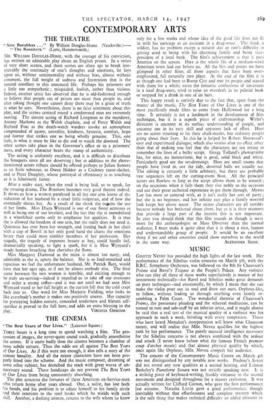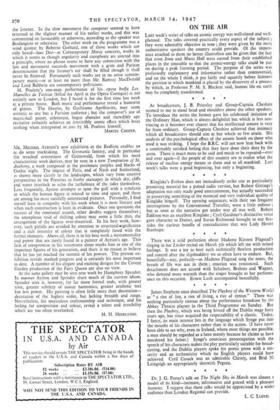MUSIC
GmErrE NEVEU has provided the high lights of the last week. Her performance of the Sibelius violin concerto on March 5th, with the B.B.C. Symphony Orchestra, was followed on the 8th by Chausson's Poeme and Ravel's Tzigane at the People's Palace. Any violinist who can play all three of these works superlatively is master of her instrument technically—for Ravel and Sibelius make great demands on pure technique—and emotionally, by which I mean that she can make the violin pour out its soul and draw out ours, Orpheus-like, to follow, without leading us through anything even faintly re- sembling a Palm Court. The wonderful rhetoric of Chausson's Poime, the' passionate pleading and the ethereal meditation, can be turned to rant and sob-stuff by an inferior artist, and it might almost be said that a real test of the musical quality of a violinist was his approach to such a work, bristling with every temptation. Those who have heard Menuhin's interpretation will know what Chausson meant, and will realise that Mlle. Neveu qualifies for the highest rank by her performance. The purely musical intelligence necessary for the Sibelius concerto is not always combined with the ardour and attack (I never knew before what the famous French premier coup d'archet meant) and that almost physical quality by which, once again like Orpheus, Mlle. Neveu compels her audience.
The concert of the Contemporary Music Centre on March 4th was not distinguished by any notable new works. Poulenc's Sextet did not reveal any new qualities at a second hearing, and Lennox Berkeley's Pianoforte Sonata was not strictly speaking new. It is a striking piece of keyboard-writing, frankly virtuosic in the second movement and designed throughout for a master craftsman. It was actually written for Clifford Curzon, who gave the first performance last autumn. Natasha Litvin gave a good performance, though Inevitably without that effortlessness and complete mastery which Is the only thing that makes technical difficulty an added pleasure to
the listener. In the slow movement the composer seemed to have returned to the slighter manner of his earlier works, and this was commented on favourably or otherwise, according as the speaker was Boulangiste or otherwise. The other work on the programme was a wind quintet by Roberto Gerhard, one of those works which are only heard—laus Deo—at Contemporary Music concerts, works in which it seems as though angularity and cacophony are erected into a principle, where no phrase seems to have any connection with the last and movement succeeds movement with a grim and Puritan determination that the listener's ear shall be filled though it shall never be flattered. Fortunately such works are in no sense contem- porary music—or at least no more than Mr. Ramsay MacDonald and Lord Baldwin are -contemporary politicians.
M. Poulenc's one-man performance of his opera buffa Les Mamelles de Tiresias (billed for April at the Opera Comique) is not entirely new to London, but I heard it for the first time last week at a private house. Both music and performance reveal a humorist of genius. The libretto, by Guillaume Apollinaire, may seem esoteric to any but a Parisian audience ; but the composer's use of music-hall patter, coloratura, bogus chorales and incredibly apt recitative certainly achieves an irresistibly comic effect which loses nothing when interpreted in tow by M. Poulenc himself.
MARTIN COOPER.



































 Previous page
Previous page